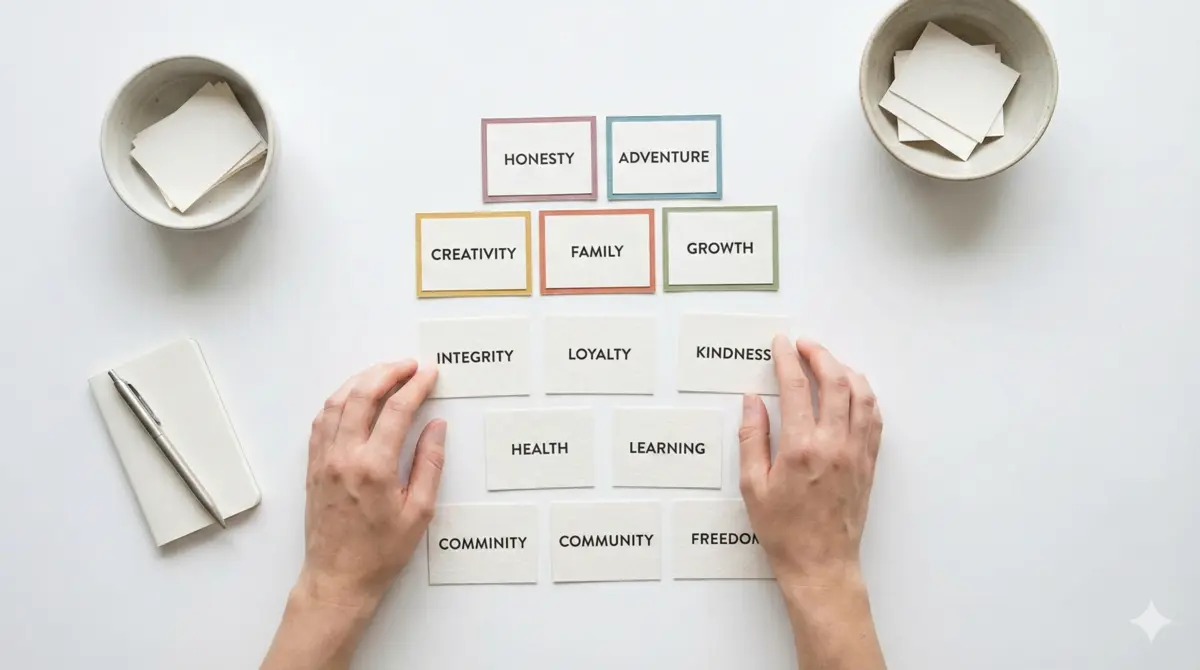Self-Identity Exploration: How to Discover Who You Really Are

Self-identity exploration answers the question “Who am I?” You examine your values, beliefs, experiences, and core traits. This process helps you build an authentic sense of self.
Understanding your identity gives you direction in life. You make better decisions when you know what matters to you. You build stronger relationships when you show up as yourself.
- Defining Self-Identity
Self-identity is your internal understanding of values, beliefs, and purpose. It differs from personality and evolves throughout your entire life. - The Value of Exploration
Identity exploration prevents living on autopilot by others’ expectations. Clear self-knowledge improves decisions, relationships, and mental health outcomes. - The Four Statuses
Four identity statuses exist: achievement, moratorium, foreclosure, and diffusion. Most people cycle through these multiple times across life stages. - Factors of Formation
Trauma, parenting style, culture, and relationships shape your identity formation. Childhood experiences create neural patterns that persist into adulthood. - Tools & Timeline
Practical exercises like values assessment and journaling accelerate self-discovery. Identity exploration takes months to years, not weeks or days.
What is Self-Identity Exploration
Self-identity is your internal understanding of who you are. It includes your values, beliefs, personality traits, and life experiences. These elements combine to create your self-concept.
Identity exploration is an active investigation of these components. You question inherited beliefs and test new perspectives. You discover what resonates and what feels false.
This process differs from personality assessment. Personality describes behavioral tendencies like introversion or openness. Identity describes your deeper sense of meaning and purpose.
Your brain builds identity frameworks from early childhood. Neural pathways form based on how you see yourself. They strengthen through repeated thoughts and social feedback.
Self-identity is not fixed or permanent. It shifts as you gain new experiences and insights. Major life events often trigger identity reassessment.

Why Identity Exploration Matters
Strong identity clarity predicts better mental health outcomes. Research shows people with clear self-concepts report less anxiety. They experience fewer depressive symptoms and greater life satisfaction.
Identity exploration improves decision-making across all life domains. You choose careers that match your values, not others’ expectations. You enter relationships that honor your authentic needs.
Clear identity reduces susceptibility to external manipulation. You recognize when others push their agendas onto you. You set boundaries that protect your core values.
Without identity exploration, many people live on autopilot. They follow scripts written by parents, culture, or society. They wake up at 40, wondering why life feels empty.
Identity work builds resilience during difficult transitions. Job loss hurts less when your worth extends beyond work. Divorce causes less devastation when you know yourself independently.
Identity Confusion Statistics
Four Stages of Identity Development
Erikson’s Identity Formation Theory
Erik Erikson identified eight psychosocial stages across the lifespan. The fifth stage, “Identity vs. Role Confusion,” occurs during adolescence. Teens must integrate childhood experiences into a coherent identity.
Success at this stage produces fidelity and a strong self-concept. Failure results in role confusion and identity diffusion. Many adults still struggle with unresolved adolescent identity issues.
Erikson believed identity formation continues throughout life. Young adults face “Intimacy vs. Isolation” after establishing identity. Middle-aged adults confront “Generativity vs. Stagnation” questions.
Marcia’s Four Identity Statuses
James Marcia expanded Erikson’s work with four identity statuses in his 1966 research. These describe different approaches to identity exploration and commitment.
Identity Achievement: You explored options and made genuine commitments. This status reflects an authentic choice after active investigation.
Identity Moratorium: You actively explore without committing yet. This temporary state involves questioning and testing possibilities.
Identity Foreclosure: You committed without exploration or questioning. You adopted others’ expectations without personal investigation.
Identity Diffusion: You neither explore nor commit to anything. This status involves avoidance and a lack of direction.
Most people cycle through these statuses multiple times. New life circumstances trigger fresh exploration periods.

What Shapes Your Identity
Parenting Styles and Early Attachment
Parenting style profoundly influences identity development patterns. Authoritative parents balance warmth with structure and boundaries. Their children develop secure attachment and healthy autonomy.
Authoritarian parents demand obedience without emotional warmth. Their children often experience identity foreclosure or rebellion. They struggle to trust their own judgment.
Permissive parents provide warmth but little guidance or structure. Their children may experience prolonged identity moratorium. They have difficulty making commitments or handling limits.
Neglectful parents offer neither warmth nor structure. Their children face the highest risk of identity diffusion. They lack models for healthy identity formation.
Secure attachment in infancy predicts identity clarity in adulthood. Secure children learn to trust themselves and others. This foundation supports later identity exploration.
| Factor | Positive Influence | Negative Influence | Actionable Tip |
|---|---|---|---|
| Parenting Style | Authoritative: warmth plus boundaries builds secure identity. | Authoritarian or neglectful styles create confusion and foreclosure. | Examine which parent messages you internalized without questioning. |
| Cultural Background | Strong ethnic identity provides community and meaning. | Cultural conflict or discrimination causes identity fragmentation. | List three cultural values you genuinely embrace versus inherited ones. |
| Trauma & Adversity | Post-traumatic growth can deepen self-knowledge and resilience. | Childhood trauma disrupts coherent self-concept formation. | Work with trauma-informed therapist to rebuild identity foundation. |
| Social Relationships | Secure friendships allow authentic self-expression and exploration. | Toxic relationships erode boundaries and self-trust. | Audit current relationships: which ones let you be yourself? |
| Life Transitions | Transitions force healthy identity reassessment and growth. | Rushed transitions without reflection create foreclosure. | Allow 6-12 months after major changes for identity integration. |
Cultural and Ethnic Background
Culture provides identity frameworks through values and traditions. Collectivist cultures emphasize group identity over individual expression. Individualist cultures prioritize personal choice and uniqueness.
Many people navigate multiple cultural identities simultaneously. First-generation immigrants balance their heritage culture with the host culture. This code-switching requires constant identity negotiation.
Ethnic identity salience increases when you belong to minority groups. Discrimination and prejudice force conscious identity awareness. Majority group members rarely examine cultural identity components.
Strong ethnic identity correlates with better psychological outcomes. It provides community, meaning, and resistance to oppression. Identity confusion increases when ethnic heritage is devalued.

Trauma and Adverse Experiences
Childhood trauma disrupts normal identity development processes. Abuse teaches children that their needs do not matter. Neglect prevents the formation of a coherent self-concept.
Complex PTSD often includes identity disturbance as a core symptom. Survivors struggle to know who they are separately. They built identities around survival and pleasing abusers.
Narcissistic abuse specifically targets and dismantles the victim’s identity. Abusers systematically undermine confidence and autonomous thinking. Recovery requires rebuilding identity from the ground up.
Post-traumatic growth can emerge through intentional identity work. Survivors integrate traumatic experiences into broader life narratives. They develop resilience and depth through conscious meaning-making.
Identity Crisis & Mental Health
Social Relationships and Peer Influence
Peer relationships strongly influence identity during adolescence and young adulthood. You try on different identities through friend groups. Social feedback shapes which aspects you develop further.
Romantic relationships trigger identity questions throughout life. You examine the compatibility of values and life visions. Healthy relationships allow both partners to maintain separate identities.
Social media complicates identity formation for current generations. Online personas may diverge significantly from offline selves. Constant comparison and performance erode authentic self-knowledge.
Work relationships and professional identities consume significant psychological space. A career becomes an identity for many people. This fusion creates vulnerability when jobs end.
Subscribe to Create Higher Vibrations!
Get Inspiration and Practical advice straight to your inbox.
Signs You Need Identity Exploration
You feel disconnected from your own life. Days blur together without a clear purpose or meaning. You go through motions without genuine engagement.
You make decisions based entirely on others’ expectations. You choose careers, partners, or lifestyles to please parents. You cannot identify your own preferences separately.
You experience frequent identity shifts depending on social context. You become different people with different groups. No consistent core self emerges across situations.
You feel empty despite external success markers. Good job, nice home, stable relationship feel hollow. You wonder, “Is this all there is?”
You struggle to answer basic questions about yourself. “What do you enjoy?” or “What matters to you?” draw blanks. You realize you never stopped to investigate.
You face a major life transition without clear direction. Graduation, divorce, retirement, or relocation trigger existential questions. Previous identity frameworks no longer fit the current reality.
You notice persistent low-grade depression or anxiety. These often signal disconnection from the authentic self. Your body registers the mismatch, your mind ignores.
Discover Your Inner Self. Join Our Self-Mastery Program.
Self-Mastery Coaching gives you the space, tools, and guidance to grow, reflect and discover your values and inner strength.

Seven Practical Identity Exploration Exercises
Self-Reflection Journaling
Write for 15 minutes daily without editing or censoring. Use prompts like “I feel most alive when…” Answer “What would I do if no one judged me?”
Track patterns across entries over several weeks. Notice recurring themes, desires, and resistance points. Write specifically, not in vague generalizations.
Journal about childhood memories before age 12. Identify early passions and natural inclinations. Notice where those got suppressed or redirected.
Values Assessment
List 20 values that might matter to you. Examples: honesty, adventure, security, creativity, family, achievement. Narrow to your top five non-negotiable values.
For each top value, write specific behavioral examples. “Adventure” might mean monthly travel or trying new restaurants. Concrete examples reveal true priorities versus aspirational ones.
Audit your current life against identified values. Do your time and energy investments match stated priorities? Gaps indicate identity-behavior misalignment.
Social Media & Identity
Personality and Strengths Testing
Take evidence-based assessments like Big Five or VIA Strengths. These tools reveal consistent patterns across situations. They identify natural tendencies versus learned behaviors.
Review results with curiosity, not judgment. No personality type is superior to others. Understanding your patterns enables better life design.
Share results with trusted friends for reality-checking. Others notice our patterns before we do. Their feedback validates or challenges test interpretations.
New Experience Sampling
Try one completely new activity monthly for six months. Sign up for classes outside your comfort zone. Attend events where you know no one.
Notice your genuine reactions versus performed reactions. What energizes you versus drains you? What sparks curiosity versus boredom?
New experiences bypass habitual identity stories. You discover capacities and interests you never imagined. Breaking routine reveals hidden aspects of self.

Feedback Collection
Ask five people who know you well for honest feedback. Request three words they would use to describe you. Ask what they see as your core strengths.
Specifically request feedback about your blind spots. “What do I do that undermines my goals?” “When do I seem least authentic?”
Compare feedback against your self-perception. Large gaps indicate limited self-awareness. Consistent themes across multiple people reveal objective patterns.
Life Timeline Mapping
Draw a timeline from birth to the present day. Mark significant events, transitions, and turning points. Include both positive and difficult experiences.
For each major event, note how it changed you. What beliefs formed? What capacities developed? What parts of yourself got buried?
Identify moments when you felt most authentically yourself. What circumstances allowed that authenticity? How can you recreate those conditions now?
Identity Wheel Exercise
Draw a circle and divide it into eight sections. Label each: career, relationships, spirituality, creativity, health, learning, community, leisure.
Rate current satisfaction in each area from 1-10. Mark your rating on each spoke from center to edge. Connect the marks to show your current identity balance.
Note which areas you neglect or over-invest in. Balanced identity includes multiple domains. Over-identification with one area creates fragility.
Identity Reevaluation in Young Adults
Identity Crisis: Recognition and Recovery
An identity crisis occurs when your current self-concept stops working. Previous beliefs, values, or roles no longer fit your reality. You feel lost about who you are.
Common triggers include major life transitions. Graduation, marriage, divorce, job loss, or relocation disrupts identity. Trauma, illness, or loss of loved ones force reassessment.
Identity crisis symptoms include persistent confusion and indecision. You cannot make choices because you lack internal reference points. Anxiety and depression often accompany identity questioning.
Some people experience depersonalization or a feeling unreal. You observe your life from outside yourself. Nothing feels genuinely connected to who you are.
An identity crisis varies from weeks to several years. The process cannot be rushed or bypassed. Forcing premature resolution creates identity foreclosure.
Recovery requires tolerance for uncertainty and not-knowing. You must release old identity frameworks before new ones emerge. This liminal space feels frightening, but is necessary.
Therapy accelerates identity crisis resolution and integration. A skilled therapist provides structure and support during confusion. They help you distinguish authentic emerging identity from reactive choices.
Identity crises often produce significant growth when navigated consciously. You emerge with deeper self-knowledge and authenticity. Previous superficial identities fall away permanently.

Common Challenges in Identity Exploration
External Expectations vs. Authentic Self
Family expectations create powerful identity pressure from birth. Parents project their unlived dreams onto children. Cultural traditions prescribe acceptable life paths.
Professional roles demand specific persona performance at work. You suppress aspects that do not fit the image. This splitting exhausts and fragments identity.
Social media amplifies performance pressure across all life domains. You curate an identity for public consumption. The gap between real and presented selves widens.
Distinguish between genuine values and internalized expectations. Ask “Do I actually want this, or just think I should?” Notice when “should” language dominates your thinking.
Set boundaries with people who pressure conformity to their agenda. State your choices clearly without defending or explaining. Their disappointment belongs to them, not you.
Fear of Change and Unknown
Identity exploration threatens familiar self-concept, even negative ones. Known misery feels safer than an uncertain possibility. Your nervous system resists identity shifts.
Fear of disappointing others keeps many people trapped. You prioritize their comfort over your authenticity. This trade-off breeds resentment and depression.
Fear of success and expansion can block identity growth. A bigger identity means more responsibility and visibility. Small identity feels safer, though it suffocates.
Start with small identity experiments rather than dramatic changes. Try new perspectives in low-stakes situations first. Build tolerance for identity flexibility gradually.
Work with a therapist to process identity-related fears. Many connect to early attachment injuries and trauma. Healing these wounds enables safer exploration.
Identity Grief After Major Life Shifts
Major transitions require grieving your previous identity. Who you were in that job, relationship, or role dies. This loss deserves acknowledgment and mourning.
Many people skip identity grief and jump to a replacement identity. This bypass stores unprocessed loss in your body. It emerges later as depression or physical symptoms.
Career loss often triggers profound identity grief. Western culture fuses identity with professional role. “What do you do?” means “Who are you?”
Allow yourself to feel sadness about released identity versions. Honor what that identity provided while it served you. Gratitude and grief coexist during healthy transitions.
Identity grief includes anger at the time lost in wrong identities. You may rage at parents, culture, or yourself. This anger fuels the determination to live more authentically forward.
New identity emerges after adequate grieving and integration. Rushing replacement identity produces hollow substitutes. The gap between old and new requires patient tolerance.
Identity Exploration Across Life Stages
Adolescence (12-18)
Adolescence centers on identity versus role confusion. Teens separate from parents and establish an independent identity. Peer groups provide testing grounds for different personas.
Physical changes trigger questions about the body and gender identity. Sexual orientation awareness and exploration typically begin now. Cultural identity becomes more conscious and examined.
Adolescent brain development supports abstract self-reflection. Teens can imagine multiple possible selves simultaneously. They test identity through fashion, music, and friend choices.
Healthy adolescent identity exploration requires safe boundaries plus freedom. Too much control produces rebellion or foreclosure. Too little structure produces dangerous experimentation.
Young Adulthood (18-30)
Young adults make major identity commitments in multiple domains. Career paths, romantic partners, and living situations solidify. These choices shape identity for decades.
Many young adults experience a "quarter-life crisis" around age 25. Early commitments made without adequate exploration feel wrong. They face starting over or settling.
Modern young adults delay traditional milestones longer than previous generations. Marriage, parenthood, and career establishment occur later if at all. This extends identity exploration but also increases anxiety.
Graduate education and career training provide legitimate moratorium status. Young adults can explore without full adult responsibility yet. This protected space supports healthy identity development.
Midlife (40-60)
Midlife brings "Generativity versus Stagnation" questions. Adults examine their legacy and contribution. Previous identity investments get reassessed.
Many experience a midlife identity crisis when early choices stop satisfying. The "midlife crisis" is actually identity renegotiation. People question who they became versus who they wanted to be.
Empty nest, aging parents, and health changes trigger identity shifts. Roles that organized life fall away or transform. New identity must incorporate aging and mortality awareness.
Midlife offers an opportunity for authentic identity reclamation. Social pressure decreases and self-knowledge increases. Many report their 50s as the most authentic and satisfying decade.
Later Adulthood (60+)
Later adulthood confronts "Integrity versus Despair" questions. You integrate your entire life story into a coherent narrative. Acceptance of choices made determines well-being.
Retirement removes work-based identity for many people. This transition triggers a crisis when career-defined self-worth is at stake. Healthy aging requires identity beyond professional roles.
Physical decline and loss of loved ones reshape identity. You grieve capacities and relationships that defined you. New identity incorporates wisdom, acceptance, and meaning-making.
Generativity continues through mentoring, legacy-building, and creative expression. Older adults contribute their accumulated knowledge to younger generations. This connection provides ongoing purpose and identity.
Final Takeaway
The journey of self-identity exploration is a courageous and rewarding path to take. Understand your sense of self. Embrace change. Seek continuous growth.
By doing these, you can lead a life that is authentic and fulfilling. Remember, this journey is uniquely yours, and every step you take brings you closer to unveiling your true self.
Take the first step today. Dedicate a few minutes each day to self-reflection. Use self-identity development exercises or find your true self exercises. Ask yourself the questions that matter and seek out experiences that align with your passions and values.
Begin your exploration today and unlock the full potential of your authentic self.


